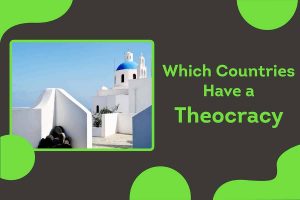Which Countries Have a Theocracy? Theocracy Examples Countries
Share
The word theocracy comes from a Greek word meaning ‘the rule of God.’ It meant that the church ran the government.
Theocracy is a type of government where a religious leader rules in the name of a god or goddess. Deities are considered to be the supreme rulers and guide the leaders. The rules are based on religious laws and scripts.
Theocracy is one of the oldest forms of government. Jewish commonly practiced it in ancient times.
So, you probably must have asked yourself, which countries practice theocracy?
Well, in ancient times, there were many theocracies. But with time, many have failed and got abandoned. Some of the countries that the theocratic government once governed include; Japan, China, ancient Egypt, Tibet, and Israel.
Theocratic governments still govern counties like Sudan, Iran, Saudi Arabia, Mauritania, Vatican City, and Afghanistan.
Theocracy Explained
Theocratic governments have existed in many countries and regions throughout history. For instance, in ancient Egypt, the Pharaoh was seen as the offspring of the sun-god.
He was also a religious leader, and he ruled the country based on religious laws. Ancient Egypt was thus a theocracy.
Change is inevitable. As time passed, theocracy governments become a thing of the past in many countries. People felt the need to be governed by elected representatives through a democratic process. This led to the failure of theocracy in many countries.
The democratic system was adopted. It was believed to be fair and had solutions to problems that theocracy couldn’t solve. Since people themselves elected their leaders, they had a lot of faith in them.
In democratic governments, leaders are elected through a free and fair process. Every citizen with eligible age is required to participate in the process. Now, the time has taught us that democracy doesn’t have all the answers.
Somehow, leaders find a way to cling to power. And as such, democracy has not served its primary purpose, which was an equal and fair chance to inheritance.
Countries That Currently Have Theocracy
The wave of time had some countries change their theocratic way of governance. But some remained the same. In such countries, religious roots are entrenched deep into their beliefs. Here are some modern-day countries that still practice theocracy.
1. Vatican City
The supreme leader in Vatican City is the pope. The roles of the pope include leading various branches of the government, including the judicial, executive and legislative.
The Vatican has an elective theocratic monarchy guided by Christian beliefs. The monarch is non-hereditary for obvious reasons.
The leaders don’t marry and, as a result, have no one to inherit the leadership mandate.
2. Iran
A theocratic government governs Iran. The leader needs to have a firm understanding of the Islamic religion. He is also supposed to ensure that people live and abide by Islamic principles.
Shah monarchy, headed by Muhammad Reza Pahlavi, ruled the country before forming Iran’s Islamic Republic.
In 1979, Grand Ayatollah Ruhollah Khomeini overthrew Reza and became the leader of the Iran Islamic state. Political systems were formulated based on traditional Islamic beliefs.
3. Afghanistan
The official religion in Afghanistan is Islamic. Most foundations of political institutions are based on Sharia Law. Religious leaders have the utmost political power and influence.
4. Saudi Arabia
Saudi Arabia is another country governed by an Islamic theocratic monarchy. The Sunni School of Islam and The Holy Quran serve as the constitution. The practice of religion other than Islam is met by resistance.
The country is home to the city of Mecca and Medina. The two cities are the holiest Islamic cities. Since the early 1930s, the country has been ruled by the house of Saud.
5. Mauritania
Mauritania is a small country located in western North Africa. It is an Islamic republic with a theocratic government.
Colonel Mohammed Khouna was responsible for the country’s shift towards Sharia Law-based governance.
6. Sudan
Sudan is another country in Africa that has theocracy. The majority of the population is Muslims. The government punishes those that go against Sharia law.
At the same time, they are keen to protect themselves from allegations of religious intolerance.
7. Yemen
Yemen is also governed by theocracy. Sharia law dictates the legislative, executive, and judicial branches of the government.
The country has suffered political unrest for quite some time now. The differences between major political regimes led to a civil war in the country.
Countries That Once Had Theocracy
1. Ancient Egypt
Ancient Egypt is one of the renowned theocracies in the world. The theocracy monarchy lasted for approximately 3,000 years.
Their leader, Pharaoh was believed to be a direct connection to the deities.
Pharaoh was guided by the advisors and high priests in running the country. The religious scripts inspired them to write the governing rules.
2. Japan
An emperor led the theocracy in japan. The emperor was the supreme leader and was seen as a living god. People believed he was the direct descendant of Shinto, the sun goddess.
3. Israel
Before adopting the monarchy, Israel was ruled by judges. These judges were believed to be the representatives of Yahweh.
4. Tibet
Buddhists ruled Tibet. This practice began as early as 1642
5. China
Believe it or not, china was once a theocracy state. The son of haven held the Chinese sovereign.
Advantages And Disadvantages of Theocracy
Just like any government institution formed and led by men, theocracy also has its advantages and disadvantages.
To determine whether theocracy is good or bad, we first need to weigh the pros and cons. Here are some of the advantages and disadvantages of theocratic governance.
Advantages Of Theocracy
Smooth Running
In a theocratic government, new laws and bills and easily passed. This is contrary to the democratic system, where the bills have to pass multiple stages of scrutiny.
The ruling leader in a theocracy is only required to make a declaration, and that it! The declared laws are formulated in a way to show that God was behind the change.
Encourages Unity And Patriotism
Theocratic states enjoy high levels of patriotism from the citizens because of the single shared religious belief. Often their physical and spiritual needs are the same. Everyone feels like they are on the same team.
Centrally Structured
The centrally structured organization allows for easy running of theocratic nations. The church and state co-exist and work together for a common goal.
With one person giving directions, a lot can be accomplished. Also, there is little room for confusion when it comes to the dissemination of information.
This is because information only comes from one central place; the supreme leader.
High Levels Of Legislative Compliance
Theocratic governments tend to use the fear of religion and prosecution to gain total control over their citizens. With this level of control, productivity can greatly be increased.
Disadvantages Of Theocracy
Alternate Views Are Not Warmly Welcomed.
This is one of the largest flaws in theocracies. Those with a controversial opinion are seen as traitors and are subjected to harsh treatment.
Minority Groups Are Not Tolerated.
In most Islamic theocracies, other religions are ‘forbidden.’ The law may not clearly state this, but the way they treat people from other religions speaks a lot.
Little Room For Change
One thing that theocracies can’t let go of is their traditional religious beliefs. This has resulted in many theocracies lagging behind in terms of development.
It is essential for any nation to first accept change in order to improve and develop.
Cruel Punishment
Punishment in a theocracy state is characterized by inhumane practices, especially for those who don’t believe in the god the state recognizes. This cruel punishment has resulted in many citizens living in fear.
No Freedom
Censorship is prevalent in many theocracy states. Freedom of speech is limited. In addition, the media and information are under the governments’ grip. Anything that speaks ill of the supreme leader is not tolerated.
Educational PROBLEMS
Many theocracies believe that the words in the scripture are the only truth. As a result, topics and even subjects that contradict the scripture are excluded from the education curriculum.
This practice negatively affects the education and learning process, especially for the youths.
Difference Between Democracy And Theocracy
The main difference between the two lies in the definition. It is how the leaders are chosen and by who. Here are some differences between the two;
Democracy: The government is formed and controlled by elected representatives.
Theocracy: The government is under the control of the state-sponsored religion.
Democracy: The government is under the direct rule of the people of its jurisdiction.
Theocracy: Rule by a god.
Democracy: The elected representatives directly exercise supreme power.
Theocracy: The religious leaders act on behalf of the gods.
Democracy: People elect leaders.
Theocracy: The gods choose leaders through divine means.
Conclusion
Theocracies have existed for as long as we can remember. And some are still around even today. In today’s modern world, the majority of the theocratic government are Islamic states.
These types of governments have their pros and cons. While the practice is still working for some nations, it didn’t work for others.
Countries like Japan, China, and Israel were forced to abolish the theocratic government and adopt democratic governance.

















